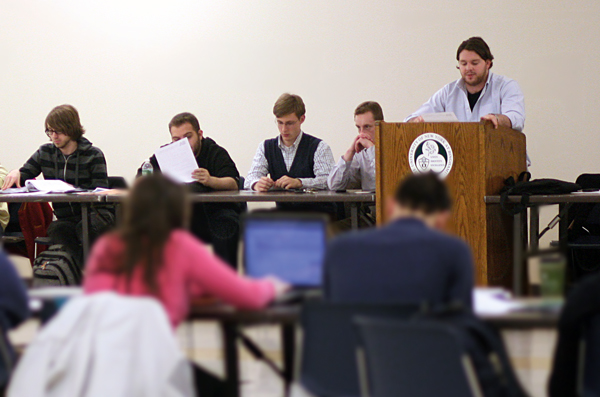
Like many students at Binghamton University, Corey Hardt did not know about next week’s student-wide vote.
Hardt, an undeclared freshman, had not read the 19-page constitution that could overhaul the Student Association, he did not know that the SA may be dissolved and reformed as a corporation and he was unaware that a vote was scheduled to take place.
But his case was not exceptional.
Many students, even those like Schuchanna Adlam, a junior majoring in sociology, who knew about the upcoming vote, were not sure whether they would support it.
“I don’t know if I’m going to vote,” she said. Adlam, who is also the corresponding secretary for Black Unity, said that she felt her understanding of the issue was not complete enough for her to cast a thoroughly informed vote.
The vote, which will be held Wednesday, April 13 in residence halls and the University Unions, will determine whether the SA will become a not-for-profit corporation. Primarily, this would remove E-Board members from being personally accountable in any lawsuits against the SA.
Under the current system, E-Board members would have to pay out-of-pocket for damages awarded in a lawsuit. Incorporation would mean that the SA would bear the burden of any potential lawsuit.
The overhaul would also involve a restructuring that would give the SA Executive Board members votes in the legislative body.
Hardt said he would support the changes.
“It sounds like a good idea,” he said. “I feel like they probably know what they’re doing.”
But he was also unsure whether “students are educated about it or voting blindly.”
Xiaoming Xue, an undeclared freshman who had not heard about the changes, said she also would support them.
“If we combine, then they would have much more information,” she said, commenting on the fact that the communication between the E-Board and the legislative body could be improved if they are paired together. She said, however, that she does not plan to vote.
Michael Wittenberg, a freshman majoring in English, was “more apt to keep it as an organization.” He was concerned that even though he received the e-mail notifying students about the vote, “it should be much more out in the open.”
Some of the University’s top administrators are not as concerned about the politics of the changes but are focused on how it would affect the relationship between the SA and the administration.
Vice President for Administration James Van Voorst said he is “somewhat neutral about it.” He said that the administration has an “excellent working relationship” with the SA, and that the vote would likely not affect that relationship. The administration and the SA would still be linked financially, since SUNY policy requires the administration to collect the student activity fee that funds the SA budget.
Brian Rose, vice president for student affairs, said that the administration has “not approached the proposed incorporation of the SA from the point of view of being for or against it. We have assured ourselves that the SA can incorporate without creating irresolvable problems under University policy.”
He also said he did not think that incorporation would significantly change the way the University interacts with the SA.
“Ultimately, this is more of a student and student organization matter than it is a University concern,” Rose said. “I would therefore encourage students to understand the proposal before voting and to understand clearly if the proposed change in structure would have any impact on their own interests and whether that impact is likely to be positive, negative or neutral.”
The referendum is scheduled from 1 to 7 p.m. on Wednesday.


